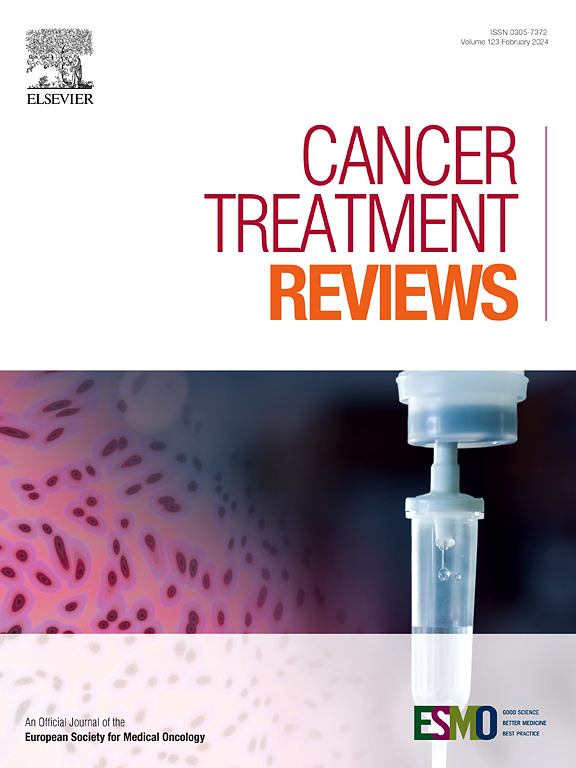Antibody-drug conjugates in NSCLC with actionable genomic alterations: Optimizing smart delivery of chemotherapy to the target
IF 9.6
1区 医学
Q1 ONCOLOGY
引用次数: 0
Abstract
The advent of antibody-drug conjugates (ADCs) aims to transform the therapeutic landscape of advanced non-small cell lung cancer (NSCLC). The distinctive architecture of ADCs enables the targeted delivery of highly potent cytotoxic payloads directly to cancer cells that express the molecular target specified by their monoclonal antibody component. This precision targeting stems from the notion that ADCs may be highly effective therapeutic agents, particularly for treating NSCLC tumors harboring actionable genomic alterations (AGAs). In this context, ADCs can be categorized into two main types: Biomarker-selected ADCs, which require the tumor to present a specific pattern of the protein targeted by the ADC (e.g., MET overexpression, HER2 overexpression or mutation) and formally requiring biomarker testing, and biomarker-agnostic ADCs, which target proteins that are broadly expressed in lung cancer cells (e.g., anti-TROP2 or HER.3 ADCs), and hence no pre-testing is required. The cytotoxic payload is expected to be delivered in high concentration in the cancer cells carrying the corresponding target of interest, while minimizing off-target toxicity. In this review, we describe available evidence regarding the efficacy and safety of ADCs in NSCLC harboring AGAs. We also discuss the challenges with respect to appropriate biomarker selection, dose optimization, treatment duration, and optimization of the structural design of ADC components to maximize efficacy while minimizing off-target toxicity. Finally, addressing cost-effectiveness concerns remains critical for their successful adoption within healthcare systems.
具有可操作基因组改变的非小细胞肺癌抗体-药物偶联物:优化靶向化疗的智能递送
抗体-药物偶联物(adc)的出现旨在改变晚期非小细胞肺癌(NSCLC)的治疗前景。adc的独特结构使其能够将高效的细胞毒性有效载荷直接靶向表达其单克隆抗体成分指定的分子靶标的癌细胞。这种精确靶向源于adc可能是非常有效的治疗剂的概念,特别是用于治疗具有可操作基因组改变(AGAs)的非小细胞肺癌肿瘤。在这种情况下,ADC可以分为两种主要类型:生物标志物选择型ADC,它要求肿瘤呈现特定的ADC靶向蛋白模式(例如MET过表达、HER2过表达或突变),并且正式需要进行生物标志物检测;生物标志物不确定型ADC,其靶向在肺癌细胞中广泛表达的蛋白(例如抗trop2或HER.3 ADC),因此不需要预先检测。细胞毒性载荷有望在携带相应目标的癌细胞中以高浓度递送,同时最大限度地减少脱靶毒性。在这篇综述中,我们描述了关于adc治疗携带AGAs的NSCLC的有效性和安全性的现有证据。我们还讨论了适当的生物标志物选择、剂量优化、治疗时间和ADC成分结构设计优化方面的挑战,以最大限度地提高疗效,同时最大限度地减少脱靶毒性。最后,解决成本效益问题对于在医疗保健系统中成功采用它们仍然至关重要。
本文章由计算机程序翻译,如有差异,请以英文原文为准。
求助全文
约1分钟内获得全文
求助全文
来源期刊

Cancer treatment reviews
医学-肿瘤学
CiteScore
21.40
自引率
0.80%
发文量
109
审稿时长
13 days
期刊介绍:
Cancer Treatment Reviews
Journal Overview:
International journal focused on developments in cancer treatment research
Publishes state-of-the-art, authoritative reviews to keep clinicians and researchers informed
Regular Sections in Each Issue:
Comments on Controversy
Tumor Reviews
Anti-tumor Treatments
New Drugs
Complications of Treatment
General and Supportive Care
Laboratory/Clinic Interface
Submission and Editorial System:
Online submission and editorial system for Cancer Treatment Reviews
 求助内容:
求助内容: 应助结果提醒方式:
应助结果提醒方式:


